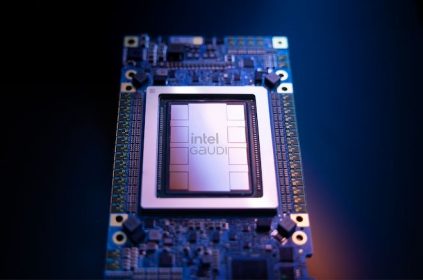
In a groundbreaking move, Microsoft has unveiled two custom-designed chips, Maia and Cobalt, signalling a strategic shift in handling the soaring costs associated with artificial intelligence (AI) services. This move mirrors a trend among major tech players, including Alphabet, who opt to develop in-house solutions to rein in expenses.
Maia: Boosting AI Computing Tasks
Introduced at the Ignite developer conference in Seattle, Maia takes centre stage. This chip aims to accelerate AI computing tasks, serving as the backbone for Microsoft’s subscription software offerings and the Azure cloud computing service. Designed for large language models, it powers Microsoft’s Azure OpenAI service, a testament to their collaboration with ChatGPT creator OpenAI.
Microsoft emphasises that Maia won’t be up for sale; it will fuel their subscription services and contribute to the Azure ecosystem. With a particular focus on optimising costs and performance, Microsoft envisions Maia as a cornerstone for its upcoming $30-a-month “Copilot” service catering to business software users and developers seeking custom AI solutions.
Scott Guthrie, the executive vice president of Microsoft’s cloud and AI group, asserts that Maia offers a streamlined approach to enhance customer solutions: “We think this gives us a way that we can provide better solutions to our customers that are faster and lower cost and higher quality.”
ALSO READ: Key Factors Behind Startup Failures in Africa
Cobalt: Microsoft’s Answer to Amazon Web Services
Alongside Maia, Microsoft introduces Cobalt, a central processing unit (CPU) developed in collaboration with Arm Holdings. Positioned as both a cost-saving internal tool and a strategic response to Amazon Web Services (AWS), Cobalt signifies Microsoft’s intent to challenge Amazon’s in-house “Graviton” chip series directly.
Cobalt has already undergone testing, with its potential application in powering Teams, Microsoft’s business messaging tool. Guthrie outlines Microsoft’s competitive strategy: “We are designing our Cobalt solution to ensure that we are very competitive both in terms of performance as well as price-to-performance (compared with Amazon’s chips).”
While AWS maintains its dominance with the Graviton chip, Microsoft’s foray into direct chip sales indicates a robust effort to reshape the cloud services landscape.
Technical Insights and Future Outlook
Although Microsoft provided limited technical details, it shared that both Maia and Cobalt are manufactured using 5-nanometer technology from Taiwan Semiconductor Manufacturing Co. (TSMC). Notably, Maia’s networking approach opts for standard Ethernet cabling, a departure from the custom Nvidia networking technology used in Microsoft’s OpenAI supercomputers.
AAs Microsoft positions itself for a future where AI services seamlessly integrate with personal computers and phones, industry analysts believe these strategic chip developments will play a pivotal role in Microsoft’s sustained growth.
With Amazon’s AWS Developer Conference on the horizon, the competitive dynamics between Microsoft and Amazon in the cloud computing realm promise to evolve, fueled by innovations in AI hardware.
In the ever-evolving landscape of AI and cloud services, Microsoft’s latest chip unveiling signals not just a cost-conscious move but a strategic manoeuvre to redefine industry standards and competition. The tech world eagerly awaits the next chapter in this unfolding saga.


















 and then
and then